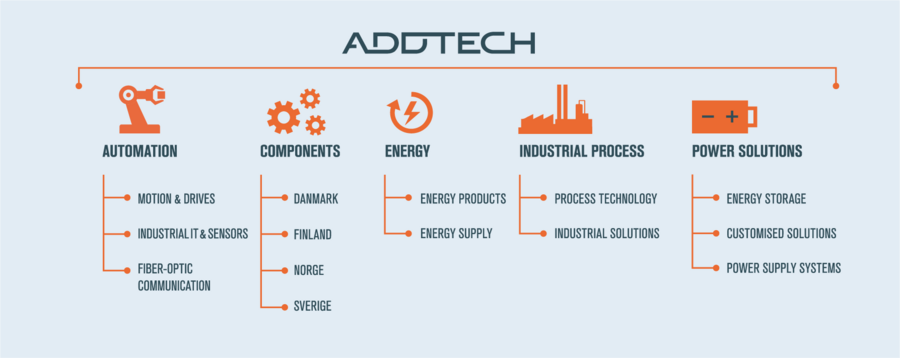ORGANISATION
Both small-scale and large
We are convinced that the best business decisions are made close to the customer and the market. For this reason, our 130 subsidiaries, with their 2,700 employees, are run in a highly decentralised and entrepreneur-oriented model, in accordance with the principle of freedom under responsibility.
Since 1 April 2019, Addtech has been organised into five business areas: Automation, Components, Energy, Industrial Process and Power Solutions. These, in turn, consist of a number of business units, corresponding to various market segments. It is within the business units that the important work of identifying and addressing new business and development opportunities takes place. This is also where the conditions are generated to exchange knowledge between the subsidiaries and collaborate as a network. In practice, this is where Addtech embodies the concept of combining the flexibility, personality and efficiency of small businesses with the resources, network and long-term perspective of a large corporation.
Development support
Addtech does not manage any of the operations at a detailed level, but acts instead as an active owner. Through board meetings, economic follow-ups, knowledge sharing and a number of tools within for example digitalisation, treasury, sustainability, innovation, education, IT and recruitment, Addtech provides subsidiaries the optimum conditions for profitability and growth. In turn, the subsidiaries focus entirely on developing their business with suppliers and customers, supported by their boards.
An increasingly important development platform is the Addtech Academy, our own business school. Addtech Academy regularly offers employees of the companies training in, for example, sales and negotiation techniques, while also providing a natural forum that strengthens the corporate culture simply by ensuring that people from different parts of the Group meet.
Common denominator
The subsidiaries largely shape their own business concepts within Addtech’s frameworks. The common denominators are always the following:
- The companies market and sell technical products in select niches.
- • The companies always act as a technology partner and specialist, helping customers identify the right solutions for their unique needs, regardless of whether the operations involve own products and brands, customised solutions or trade products.
- • With their technical expertise, long-term customer relationships and in-depth understanding of the customers’ operations and applications, the subsidiaries are able to build partnerships with world-leading companies.
